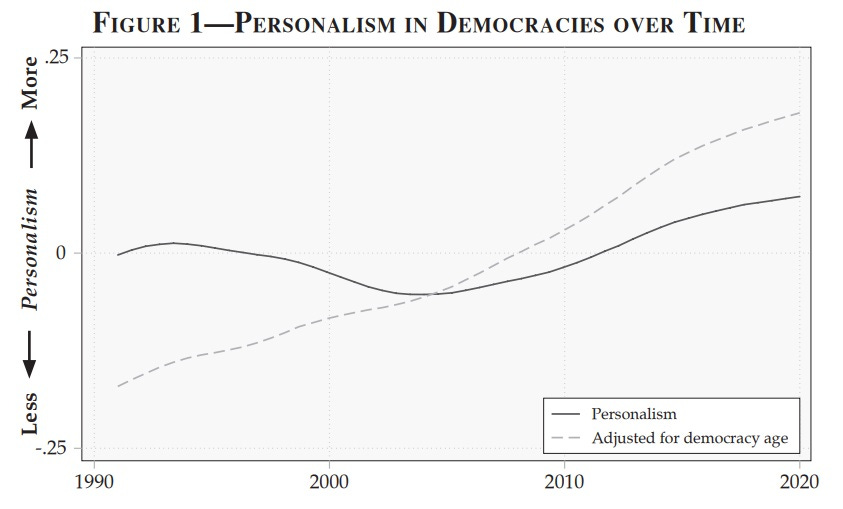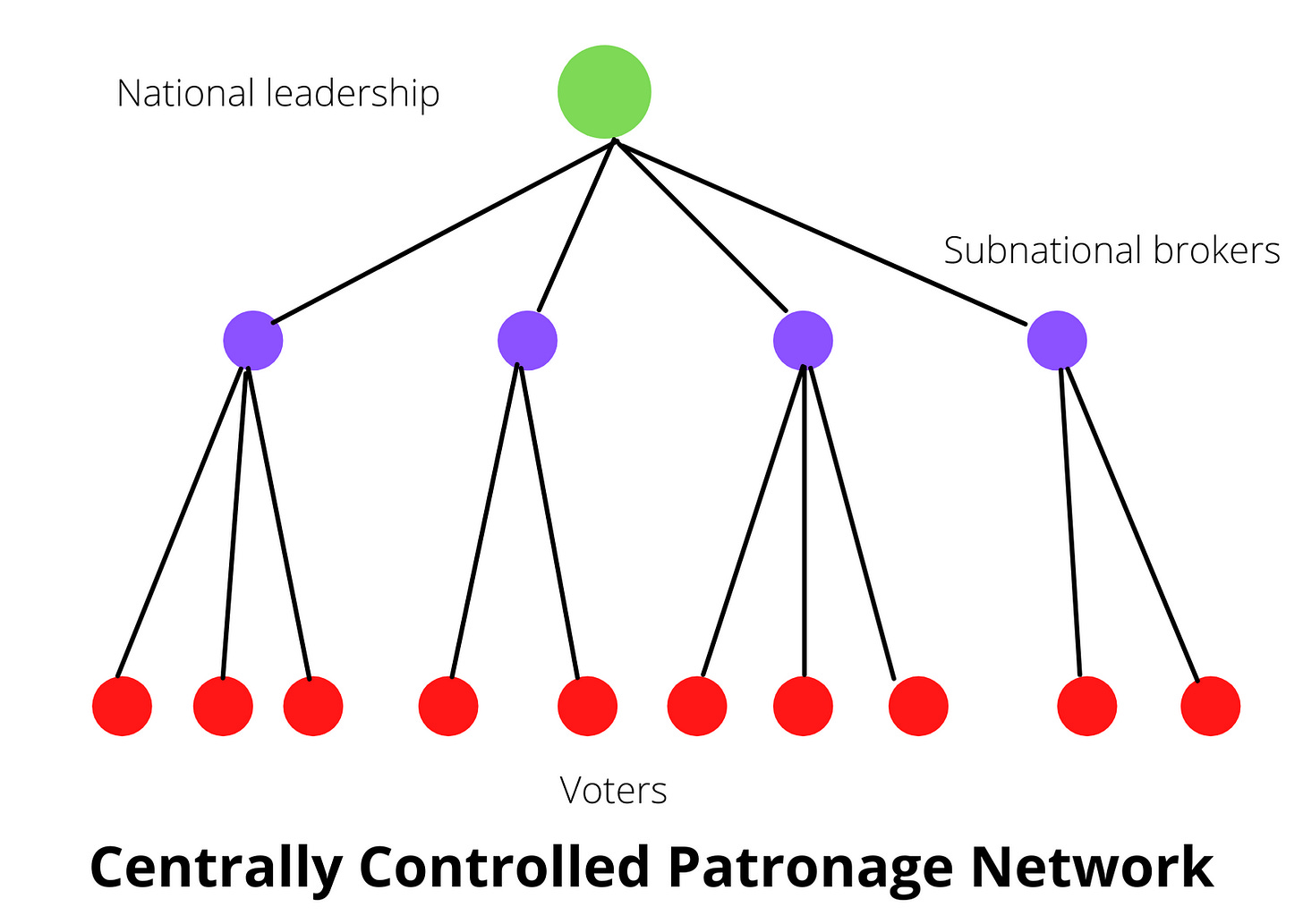Dispatch #47: So help me God!
In this dispatch we will discuss the role of personalist leaders in undermining democracy and fueling populism
In the ‘House of Cards’ series, Francis Underwood gave one of the best explanations of political power and authority, during the swearing in ceremony of President Walker.
Underwood said:
Power is a lot like real estate. It’s all about location, location, location. The closer you are to the source, the higher your property value
After being denied the Secretary of State position, Underwood was determined to take down everyone in his party who snatched the dream right under his nose. He undermined his party leadership, arm twisted opponents, threatened journalists and stole election to become the most powerful man of the free world.
After tightening his grip on the party, he became the party and the party became him.
This tactic is a very common one in a demagogue’s playbook. This is also known as the personalisation of politics. In simple terms this means ‘the process of concentrating power in the hands of a leader within a regime’.
In a new article titled ‘How personalistic politics is changing democracies’, for the Journal of Democracy, Erica Frantz from the Michigan State University and her co-authors have explained this phenomenon and its impact on the democracies in the world.
They define personalism as:
The domination of the political realm by a single individual. The leader’s personality has an outsized impact on policies and outcomes, often trumping institutions and rules. In contemporary politics, we typically associate this sort of rule with authoritarian regimes. In such a personalist autocracy, the leader governs absent the constraints of other actors: Not even the leader’s political party (should it exist) or the security apparatus exert independent control. Policy choices, in turn, reflect the whims of the ruler
-Frantz and others
They argue that personalist politics has been the norm for the bulk of our political history. Emperors of Rome, Pharaohs of Egypt and czars of Russia are examples of personalistic politics that used repression to hold on to political power. With a small departure in the 20th century and with the ‘third wave of democracy’ the representative politics has definitely increased, but in the past decade or so the pattern has started to reverse.
Personalist politics is not only restricted to authoritarian regimes but has grown its presence in democratic governments as well with the dismantling of the institutions that could have checked the leader.
Political developments in the last decade suggest that the global trend toward personalism may no longer be confined to authoritarian systems. Across the globe, democratically elected leaders with personalist governance styles have been dominating headlines, from U.S. president Donald Trump and Brazilian president Jair Bolsonaro to Hungarian prime minister Viktor Orbán and Philippine president Rodrigo Duterte. The apparent growth in the prominence of such leaders raises the question: Is politics becoming more personalist in democracies, too? New data that capture levels of personalism in democratic states suggest that this is indeed the case. While this trend toward greater personalism could be temporary, the drivers and consequences of this dynamic indicate that there is reason for concern
-Frantz and others
Personalism and Democracy
The authors rightly argue that higher degrees of personalism in a democracy is harmful.
Greater personalism in democracies brings with it an elevated risk of political polarization, incumbent power grabs, and ultimately democratic decline and collapse.
We find that personalist democracies—or democracies with higher than typical personalism scores—differ in meaningful ways from their nonpersonalist counterparts, and that greater personalism is detrimental to democracy. The data show that personalism increases the chance of democratic decline by enabling the successful power grabs by incumbents—the incremental dismantling of democracy—that have become the most common way in which democracies break down. The adverse effect of personalism also holds for other forms of backsliding, whether a sharp decline or total regime collapse.
-Frantz and others
According to the analysis done by the authors, between 1991 and 2020, the raw level of average personalism in democracies has increased since the mid-2000s.
They further add that rise in personalism in a democracy is correlated to rise in populism. The personalist leaders position themselves as one amongst the people and someone who can only fix things. Cas Mudde aptly defines this as ‘a thin-centered ideology that considers society to be ultimately separated into two homogeneous and antagonistic camps, “the pure people” versus “the corrupt elite,” and which argues that politics should be an expression of the volonté générale (general will) of the people’
Paul D Kenny’s book ‘Populism and patronage- Why populists win elections in India, Asia and beyond’ has also touched upon a similar theme of a strong leader and populism but with a different aspect.
Paul defines populism as a political movement where a populist leader directly connects with the masses without any intermediaries through mass media and public rallies. He adds that populist leaders redefine party-voter linkages by bypassing autonomous brokers (federal leaders and other non-state actors) and establishing a direct link with the voters through their charisma and with the help of issues such as ethnonationalism, immigrants, minorities, elites, economic downturn etc.
Let’s take a look at Paul’s thesis, a bit more closely to understand how populism and personalist politics are related.
The politics in any democracy is based on party-voter linkages. These linkages play a very important role in explaining the rise of populist leaders. Once these linkages are ruptured, it gives space for demagogues to establish a direct connection with the people. There are broadly 3 types of party-voter linkages:
1) Programmatic: Key features include ‘recruitment of mass party membership, mobilization of civil society interest groups’.
Paul adds, “The defining feature of programmatic parties is that they are based on stable institutionalized relationships with supporters. the linkages between programmatic parties and voters primarily occur through party membership and membership of aligned civil society organisations. Parties’ policy platforms are consistent with the interests-both economic and cultural-of its supporting groups. Programmatic parties embody a range of ideological commitments”.
2) Patronage: Key features include ‘a quid pro quo in which votes are exchanged for material benefits’.
Paul further describes,"What is distinctive about patronage as a form of exchange is its particularistic nature. Patronage parties link voters and parties through the reciprocal exchange of votes for the particularistic provision of public resources”.
3) Populist: Key features include ‘a personalistic or charismatic leader who looks to gain or retain power based on direct,unmediated and un-institutionalized support from large numbers of mostly unorganized followers’.
Paul adds that populists “rely more heavily on ad hoc, centripetal, and weakly institutionalized direct links with voters established through the mass media and mass rallies.”
This is a good framework to understand populism in India.
Paul argues that Modi is not the first populist leader that India has seen. Indira Gandhi was the first populist leader and her regime ended with the repressive act of emergency.
The susceptibility of democracies with patronage politics slipping into populism is high because of the very design of patronage politics.
In a patronage democracy, the leader is connected to the masses through intermediaries called sub-national brokers who distribute public goods in return for political support and rents in return for the services. These brokers consolidate political support and give it back to the central leadership, up in the chain.
In Indian scenario, brokers can be state level elites, state level ministers, legislators etc. The patronage based politics is vulnerable to populism because of the inherent principal-agent bug. The central leadership depends upon these brokers to lend political support in blocks. The brokers are the face of delivering public services to the voters. The benefit of attribution in case of an efficient public service delivery goes to these brokers. If the brokers decide to use the support, which they get from the voters, to enhance their political reputation rather than sending the support up to the central leadership, then they tend to become ‘autonomous brokers’. These autonomous brokers have their own support base and retain power at state level even without central leadership’s benevolence.
In the figure above, the brokers in patronage politics have a very limited autonomy and are tightly controlled by the leader at the center. Paul writes that “they serve at the pleasure of their government patrons in the center”.
Centrally controlled patronage network means that the central leaders have powers of sanction and removal over brokers that mitigate the principal-agent problem inherent in the patronage network. Lower level brokers are thus compelled to deliver votes to political leaders at the national level in order to continue benefiting from intermediating between state and society in the delivery of goods and services. Where central control is very high, such as when mayors and governors are directly appointed, even if the latter are from different parties to those of the central government, the degree to which they can undermine the center is strictly limited.
-Paul D Kenny
In case of autonomous brokers, Paul writes, “ The brokers are no longer incentivized to serve the interest of the central leadership. Instead they serve only their own and their clients’ (voters) interests”. He further adds, “Brokers will seek to retain the loyalty of their clientele, regardless of the interests of the national leadership. In this context, subnational governing units are likely to develop into independent arenas of political contestation, and intra-party factionalism may spill over inter-party competition. This is because brokers no longer need the support of national party structures to retain their positions.”
It is this patron-client relationship between the subnational autonomous brokers and the voters that leads to inter-party competition; resentment among the voter groups who feel that they have been left out; anger because a certain voter block gets more privilege from the subnational brokers as compared to other blocks. This creates an open ground for a populist leader to establish an unmediated link with the voters bypassing the subnational brokers.
Paul writes, “Populists promise to circumvent the brokers and thus proffer a resolution to the legitimacy crisis of the old order. Populism is a boundedly rational form of mobilization against a system that is perceived to be failing, given the constraints on social organization inherent to a patronage democracy. If voters are not attached to a national party through ties of patronage or through membership in parties or affiliated organizations, this leaves them available for alternative forms of mobilization in national level elections”.
The passage below from the book is the most important one to understand populism in India:
Populists vary in the framing they use to give a collective identity to their movements, which are in practice quite diverse from a sociological perspective. Populist mobilization is consistent with the use of nativist or other identity-based rhetoric as it can function as an efficient marker for the mobilization of an electoral majority of those who feel alienated from the existing party system. Such ethnonationalist appeals are consistent with attempts to forge a multi-class base of support. Other anti-elite or anti-institutional appeals function in a similar way in populist mobilization. This is in large part because of the socioeconomic fragmentation of patronage systems, which makes vague moralistic appeals to the people have such resonance. There is notable little organization along class lines in patronage democracies, which means that programmatic alternatives to a failing patronage-based democracy are unlikely to emerge.
-Paul D Kenny
As mentioned earlier, the decline of democracy or democratic erosion is directly proportional to the increase in personalism. The chart below clearly shows that relationship.
We find statistically significant effects of personalism on democratic decay, sharp democratic decline, and democratic collapse. In terms of decay, a one–standard-deviation increase in personalism is associated with, on average, a year-on-year decrease of about 1.4 percent in the level of democracy; if this average effect continued over five years, there would be an approximately 7 percent decline.
-Frantz and others
Apart from democratic erosion and populism, Frantz and her co-authors have highlighted these phenomenon in a democratic politics:
Personalist leaders increase polarization within the society
They tend to increase polarization on policy issue within other political parties and opposition thus slowing down the legislative processes and impacting legislative scrutiny on executive’s work
Personalist leaders obliterate all checks and balances that would challenge them. Hence they undermine institutions that challenge them
Personalist leaders want to have complete control on their party and other institutions. Hence they would appoint trusted individuals and loyalists in important positions








